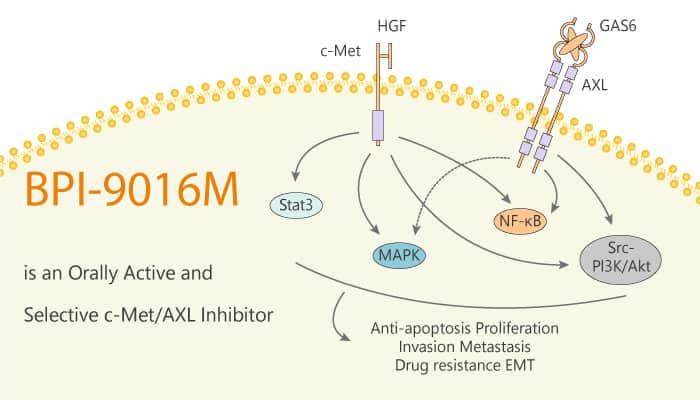c-Met is a membrane-spanning receptor tyrosine kinase. It has a high affinity for binding to hepatocyte growth factor (HGF).
As we all know, HGF/c-Met signaling often involves activation of its downstream pathways.
High-level Met gene amplification, mutation or protein overexpression can lead to aberrant activation of the HGF/c-Met pathway. In addition, this dysregulation often plays a role in tumor development and metastatic progression.
Lung cancer is a severely malignant form of human cancers. It is a leading cause of cancer death in many countries. 20–37% of tumor tissues exists Met protein overexpression, meanwhile, Met gene mutation is reported in 5–26% of NSCLC patients with EGFR inhibitor resistance.
AXL overexpression exists in 20% of NSCLC patients with resistance to EGFR inhibitors.
Additionally, AXL-targeting therapies are more and more prevalent in NSCLC patients bearing wild-type EGFR tumors.
Based on the above description, in this article, we will introduce a potent, orally active, and selective dual c-Met and AXL tyrosine kinases inhibitor, BPI-9016M.

We will describe its anti-cancer activity in vitro and in vivo.
Firstly, we can find that BPI-9016M inhibits cell proliferation in a dose-dependent manner in A549 and H1299 cells. The IC50 of BPI-9016M in several lung adenocarcinoma cell lines ( A549, H1299, H1650, H1975, HCC827, and PC-9 cells) as well as in primary lung adenocarcinoma cells are ranged from 5.3 μM to 27.1 μM.
In addition, BPI-9016M reduces expression of c-Met, p-c-Met, p-AKT and p-ERK in the H1299 and A549 cells.
Nextly, in lung adenocarcinoma patient-derived xenografts (PDX) NOD/SCID mice models. BPI-9016M dramatically suppresses tumor growth in PDX1, PDX2, and PDX3 xenografts after 16 or 12 days of treatment.
At the same time, BPI-9016M inhibits PDX4 xenografts without statistical significance.
The H-stores of PDX1, PDX2 and PDX3 tumors are 260, 210, 120, and the TGI values are 82.5%, 79.4%, 68.8% ,respectively.
However, PDX4 tumor exhibits H-store and TGI values of 20 and 32.5%, respectively.
Moreover, IHC of ki-67 also proves that BPI-9016M significantly inhibits tumor growth of lung adenocarcinoma, especially in tumors with overexpression.
In conclusion, BPI-9016M could inhibit proliferation, migration, and invasion in vitro, and suppresses tumor cell growth in vivo. It has the potential for lung cancer treatment.
Reference:
Zhang P, et al. Theranostics. 2018 Nov 12;8(21):5890-5902.